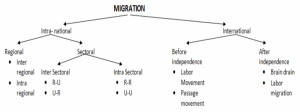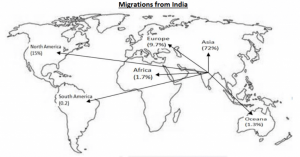27 Jul An emigration Bill that does not go far enough (The Hindu, GS-1,2, Emmigration)
Context:- The Ministry of External Affairs in June 2021 has invited public inputs to the Emigration Bill 2021.The Bill is a long overdue opportunity to reform the recruitment process for nationals seeking employment abroad.
What is Migration:- Peoples movement from one place to other.

Internal Migration:-

- Rural to Rural (47%)
- Rural-Urban (32%)
- Urban-Urban (15%)
- Urban to Rural (6%)
Types of Out Migration:-

Migration from India to the world:-

-
As per the census 2011, there are 7 broad reasons for migration.
-
For business
-
For work and employment
-
Marriage
-
Moved at birth
-
Moved with families so the dependent population also moved along with the employed population.
-
Political reasons which are mostly forced migration including ethnic, tribal, religious conflicts and displacement due to development projects)
-
Education
-
The Emigration Bill 2021 provisions:-
- A new emigration policy division in the Ministry of external affairs.
- This bill establishes help desks and welfare committees
- This bill authorises manpower agencies to conduct pre departure briefings for migrants.
- This bill provides increased accountability of brokers and other intermediaries who are also involved in labour hiring.
Issues in the Bill:-
-
- This bill will consolidate and amend the law relating to emigration of citizens of India:-
- This bill lacks a human rights framework which aims at securing the rights of migrants and their families.
- For example, the Philippines human rights framework explicitly recognises the contributions of Filipino workers and provides the dignity and fundamental human rights and freedoms of the Filipino citizen.
- This bill lacks a human rights framework which aims at securing the rights of migrants and their families.
- Emigration Bill 2021 allows the manpower agencies to charge workers for service fees, and worse is that it allows agents to set their own limits.
- According to International labour standards provided by International Labour Organization (ILO) on Private Employment Agencies Convention No. 181 and some general principles and operational guidelines of ILO for fair recruitment recognises that it is employers, not workers who should bear recruitment payments including the costs of their visas, air travel, medical exams, and service charges to recruiters.
- ILO and the World Bank reports show that Indian workers pay exorbitant charges for their jobs and that poorer workers pay progressively larger fees.
- When low wage migrants want such emigration it makes them vulnerable to indebtedness and exploitation.
- Worker Paid recruitment fees eat into their savings, force them to take high interest loans, live on shoestring budgets, and in the worst cases of abuse, leave workers in situations of debt bondage.
- Emigration Bill 2021 also permits government authorities to punish workers by cancelling or suspending their passports and imposing fines up to ₹50,000 for violating any of the Bill’s provisions.
- This particular provision of the bill can be used as a tool to crack down on workers who migrate through unregistered brokers or via irregular arrangements such as on tourist visas.
- This bill will consolidate and amend the law relating to emigration of citizens of India:-
-
Why migrants goes from the illegal channel:-
-
-
- One because of unawareness of the law, under the influence of their recruiters
- Second, because they are desperate to find a decent job, it is deplorable, runs contradictory to the purpose of protecting migrants and their families, and violates international human rights standards.
- Recruiters and public officials may misuse the law to instil fear among workers so workers may not approach to authorities.
- Emigration Bill 2021does not adequately reflect the gender dimensions of labour migration where women have limited agency in recruitment compared to their counterparts and are more likely to be employed in marginalised and informal sectors and/or isolated occupations in which labour, physical, psychological, and sexual abuse are common.
- Emigration Bill 2021 provides limited space for worker representation or civil society engagement in the policy and welfare bodies which will be setup after enactment.
-
Way forward:-
- To ensure that labour recruitment works for Indian women and men who migrate outside our borders each year:
- The Ministry of External Affairs must start at the top and a bottom up approach with workers as the lynchpin and draft a clearer purpose which explicitly recognises the contributions of Indian workers, the unique challenges they face, and uphold the dignity and human rights of migrants and their families.
Let’s Have a Big Picture:-
Issues faced by the Migrants:-
- Migrants are often exploited by the agents from the time of getting the passport till leaving the country at every level.
- Many migrants are cheated by the cunning agents by being given a menial job and sometimes no Jobs.
- Migrant workers receive a much lower salary than what is promised by the agent.
- Migrants workers alos face sexual abuse in the host country as a result they are never in a position to return as they fear social boycott by the family and the community.
- Migrants are given severe punishments with shocking cruelty in many cases, as they don’t understand the Law.
Recommendations:-
- Government should provide full employment, job security and decent wages to all its citizens.
- The State should give priority to protecting the interests of migrant workers because of obligation and also because they bring in much needed foreign exchange through remittances.
- A Law specifically relevant to migrant workers is urgently required.
- India must sign the 1990 UN Convention on Migrant Workers and their families.
- A Central Manpower Export Promotion Council is needed. This body would undertake the task of promoting the employment of Indians abroad.
Plutus IAS Current Affair Team Member



No Comments